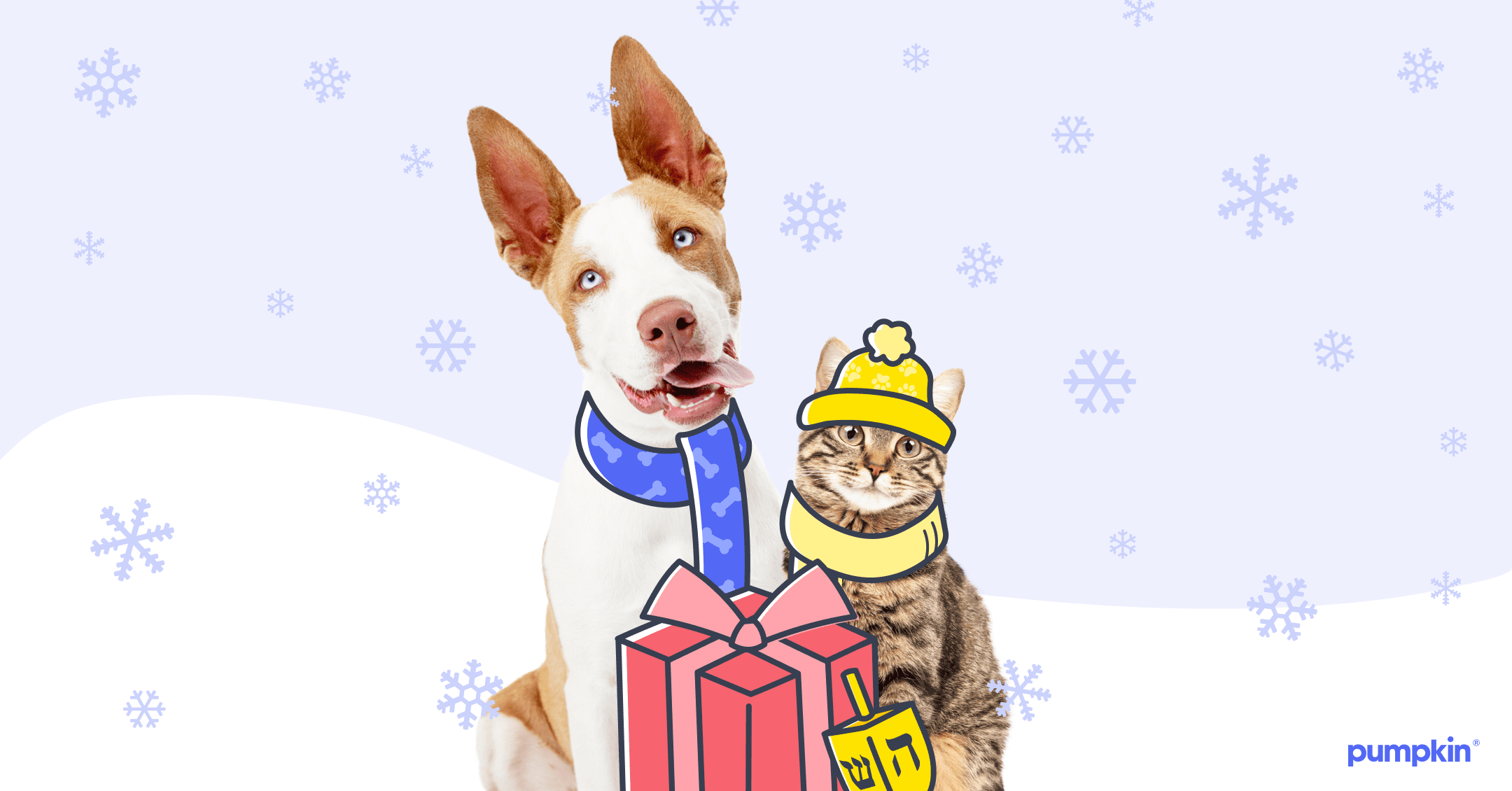Happy howlidays! Your seasonal checklist likely includes things like decorating the house, wrapping presents, and cooking tasty treats. But don’t furget to keep your puppy safe by following these easy tips:
1. Make the tree less tempting
A Christmas tree can look like a big toy to a playful pup. Securely anchor your tree and place ornaments and lights out of paws’ reach on higher branches. We recommend avoiding tinsel altogether, since it’s especially enticing and if ingested, can require surgical removal. Lastly, if you use a live tree, always vacuum or sweep stray pine needles ASAP, since they can puncture your dog’s intestines if ingested.
2. Use precaution with plants
Popular holiday plants like poinsettias, holly, or mistletoe can be toxic to pets and cause vomiting, diarrhea, and or more severe symptoms. If you discover that your kitty munched on any of these, call your vet or the ASPCA Poison Control number – your pet may need immediate treatment. “If a pet eats a poinsettia plant,” says vet Dr. Choczynski, “we might treat inflammation in the mouth and vomiting. For mistletoe ingestion, we would monitor and assist with low blood pressure, low heart rate and difficulty breathing.” To avoid a trip to the vet, be sure to keep these plants out of reach, or don’t decorate with them at all.
3. Go slow with stocking stuffers
If you give your pup a special stocking, don’t let them eat the treats all at once, since this could trigger stomach upset, vomiting, diarrhea, or even whole treats getting stuck in their windpipe or intestines. If you put toys in their stocking, look for ones that seem as indestructible as possible. You don’t want your dog to be able to chew off bits and pieces and swallow them – a ruff situation that could call for surgical removal.
Pet Pro Tip: New kitten owners often underestimate the long-term costs of veterinary care for a pet’s unexpected accidents & illnesses. Make sure you get your kitten insured as soon as possible!
4. Table the scraps
While it might be tempting to let your dog indulge as much as everyone else, rich, fatty foods like turkey or ham skin, brisket, and sausages can be much more hazardous to dogs than to us. They can cause diarrhea or, in more severe cases, a potentially life-threatening disease called pancreatitis, which causes symptoms like vomiting, stomach pain, restlessness, shaking, diarrhea, fever, and weakness. Also, dispose of leftovers in an outdoor sealed trash can or somewhere else snoopy dogs can’t get to them. Dogs are known for digging out turkey or ham carcasses and bones, both of which could get stuck in their throat or damage their intestines. If you truly become powerless against those begging puppy-dog eyes, vet Dr. Eloise Cucui of the Animal Care Centers of New York says white meat chicken or turkey are fine in moderation: “I would recommend feeding no more than one ounce total of people food. Portion control is important!”
5. Avoid snacksidents
Keep all human beverages and snacks out of your puppy’s reach, since alcohol, chocolate, and artificial sweeteners like xylitol are known to be toxic and big no-nos for pets. The most common symptoms of ingesting these substances include vomiting, diarrhea, decreased activity, and weakness. If your pup gets into any of these goodies, call your vet or the ASPCA Poison Control number right away. The most important treat to watch out for is xylitol, says Dr. Choczynski. “In the event that your pet eats sugar free candy or gum from a stocking or candy bowl, do not finish your carol or egg nog! Grab your galoshes and go directly to the vet. Xylitol can cause a life threatening low glucose level in dogs and cats.”
6. Be wary of the weather
Vets like Dr. Choczynski often see dogs come into their hospitals during the holiday season for frostbite and lameness caused by slips on ice. So if you live in a cold climate and take your pup on outdoor adventures, make sure they’re just as bundled up as you are, with booties that will grip and not slip!
7. Keep the wrapping under wraps
When wrapping and unwrapping gifts, make sure to keep paper, ribbons, string, and tinsel away from your pup, since they look like tempting toys but can cause serious stomach and intestinal damage. Also beware of leaving wrapped gifts under the tree for this same reason.
8. Don’t cause discord with cords
Teething puppies love to chew electrical cords, which could result in accidental electrocution or swallowing bits of cord. Exposed indoor or outdoor wires should be taped to the wall or sides of the house, and any wires extending away from the wall should be wrapped in hard protective plastic.
9. Protect your pup around new pets & guests
If you’re traveling for the holidays and boarding your pup, it’s important to know that dogs are at increased risk of contracting the canine cold, intestinal parasites, and fleas. Prior to boarding, Dr. Choczynski recommends vaccinating for Bordetella bronchiseptica and using a monthly flea prevention that also protects against intestinal parasites. “When looking for an excellent boarding facility, you might ask what their protocol is for screening for upper respiratory infections, fecal testing, and vaccination,” she says. If they don’t have strict protocols, you may want to consider another boarding facility or a highly-rated dog sitter from a service like Rover.
If you’re staying home but having house guests, make sure your pup has a safe place to get away from all the festivities. “While some pets can be party animals and love to be around new people,” says Dr. Cucui, “others may become quite stressed or anxious around unfamiliar sights and sounds and may prefer to stay by themselves in a quiet room. Never force your pets to interact when they don’t want to, as this can result in inadvertent bites or stress-related illness.”
10. Add pet insurance to your shopping list
The best gift you can help give your dog this holiday season is a healthy life! If any of these ruh-rohs do happen, the best way to be prepared is to get pet insurance for your puppy ahead of time. According to a financial survey from Bankrate, only 39% of Americans have enough in savings to cover a $1,000 emergency – pet insurance can help cover the costs of any emergency care, surgery, or treatment your pup would need to get better.
We hope these tips help your whole fur family have a safe & happy holiday season! If your dog gets into anything they shouldn’t, call your veterinarian immediately for advice instead of waiting for serious symptoms to develop. We also recommend keeping that ASPCA Poison Control number readily available!




